- Home
- Jennifer Moore
A Week in Brighton (Timeless Regency Collection Book 13) Page 4
A Week in Brighton (Timeless Regency Collection Book 13) Read online
Page 4
“Your mother . . .”
“Died when I was born,” he said.
“And you have no family at all?”
“None.” He played his thumb over the silver handle of the walking stick.
Daphne had never seen him so serious, nor had he spoken so openly. “It can be annoying,” she said. “A small town where everyone pokes their nose in your affairs.”
“I should love it. To have nosy neighbors bothering about my business is preferable to being alone.”
Daphne turned and kept walking. His words had given her a lot to ponder.
“So, where are we going?” he asked.
She looked up at him, confused by the question. “Uh . . .”
“Ah,” he said, tapping the side of his nose. “You didn’t have a particular destination in mind? You were just trying to avoid me?”
“Yes,” she admitted.
His teasing smile returned, and he put a hand over his heart as if wounded. “Well, Miss Dayley. I’m hurt. And I think Mrs. Libby would be very disappointed to hear it. She did think we were quite well suited.”
His words, though spoken in jest, brought a flush to her cheeks. She spoke quickly, trying to dispel it. “That could not be further from the truth, sir.”
He didn’t reply.
When her face felt sufficiently cooled, she glanced to the side to find his gaze on her. “You bring out the worst in me, Mr. Grande.” The explanation sounded defensive, but she could not help it.
“This is your worst? I don’t believe it.” He shook his head. “You haven’t yelled at me once today.”
“The day is not over, sir,” she said. She kept her face turned away as the cursed flush returned.
Daphne stopped at the end of Middle Street and pointed. “My home is that way.”
“And I suppose you’re planning to invite me in for tea?” he asked with a tease in his voice.
“No.” She looked away to hide her smile.
“Ah well, one cannot have everything.” He offered his arm. “Shall we?”
Daphne slid her hand into the crook of his elbow, and as she did, a strange wiggle moved through her middle. “Thank you.”
Early on Monday morning, Arthur, Mr. Simper, and Mr. Fawcett stood in front of the old furniture warehouse, staring at the words scrawled in bold letters over the outer wall. Though the spelling was atrocious and the vandal hadn’t bothered with punctuation, the meaning was clear. Somebody was unhappy with the building project, and more specifically, with the men in charge.
“Who could have done this?” Mr. Fawcett sputtered. Such an affront was offensive to his sense of decency. “This . . . filth . . . must be punished. And swiftly.” He stomped toward the building and rubbed his fingers on the paint, but it had dried.
“I’ve a few guesses.” Mr. Simper scratched his cheek as he spoke. “First one who comes to mind is Jim Garrick.”
“The same Jim Garrick I convinced you to rehire?” Arthur asked. He felt sick inside, looking at the words. Vulnerable at the threat.
“Sacked him again the same day,” Mr. Simper nodded. “The man couldn’t manage to come to work sober.” He motioned with his chin further down the beach to the wharf. “Last I heard, he’d taken up with some of the lads down at the docks. A rough lot, if you get my meaning.”
“Unacceptable,” Mr. Fawcett said. “This is un-ac-cept-a-ble.” He punctuated each syllable with a jab of his walking stick into the ground. His face was very red.
“Calm yourself,” Arthur said, leading Mr. Fawcett to sit onto an overturned crate. “We’ll sort this out.” He called over one of the workers and sent the man to the bakery for a cup of tea. With Mr. Fawcett’s advanced age, Arthur worried for his heart.
Mr. Simper set a few workers to painting over the words. The result was far from aesthetically pleasing, but it was much nicer than the foul language that had been so prominently on display. The wall would eventually be covered with stone anyway.
“I’ve sent for a constable,” Mr. Simper told Arthur. “Not to worry, sir. This won’t happen again.”
“Was anything stolen?” Arthur asked. “Tools? Supplies?”
“I don’t believe so.”
“And what of sabotage? Should we worry that the structure has been rendered unsafe?”
Mr. Simper shook his head. “It is a far leap from scrawlin’ profanity on a wall to thievery or property destruction.” He motioned toward the drying paint. “This here’s the work of a drunk blowing off steam.”
“I’ll send Mr. Fawcett to inquire after a night watchman,” Arthur said. “Give him something to take his mind off the insult.”
“Good idea,” Mr. Simper said.
The constable arrived and listened to their claim. But with no witnesses, there was little more the man could do than promise to speak to Jim Garrick and to keep an eye on the building site.
“Well, no use fretting about it,” Mr. Simper said. “There’s work to be done.”
Arthur admired the man’s work ethic. The threatening words had put a damper on his spirits, and he was determined to shake it.
The incident was still bothering Arthur when he stepped into Our Dayley Bread an hour later.
At the sound of the bell over the door ringing, Mary Coombs came from the kitchen. She smiled widely. “Mr. Grande, how nice to see you this morning!”
Arthur couldn’t help but smile in return. He didn’t know when he had ever met a woman with such a merry disposition. “Good morning, Miss Coombs.”
She wagged a finger at him. “Mary, sir. I insist upon it. Don’t care much for formalities.”
“Very well. Mary it is, then.”
“Now, what’ll you have today?” She opened a paper sack and moved to the display case, waiting for his order.
“Actually, I wondered if you’d join me for breakfast this morning.” Arthur motioned to the table near the window.
“Oh.” Her cheeks went red, and her grin grew. She gave a curtsey. “I would be delighted, sir.” She glanced into the kitchen and then to the front window. “Miss Dayley’s gone to the bank, and the buns are rising, so I can spare a few moments.”
“Very good.” Arthur took a plate of scones to the table, and Mary brought a tea tray. He hung his hat by the door.
She poured both cups, offering the milk and sugar. “How is Mr. Fawcett? Ron said the poor man suffered a shock.”
“We had a bit of vandalism this morning. Nothing to be worried about.”
She stirred sugar into her cup. “He’s a dear man, isn’t he? A bit persnickety, isn’t he? But he’s not hurting anyone. He’s a right pleasant man.” She poured in a bit of milk. “Well, I hope you don’t have any more trouble. Not with you being such a nice person and all. You don’t deserve it. Not one bit.” She put a dollop of clotted cream onto her scone and kept up her steady discourse. “You certainly don’t deserve the treatment you’ve gotten from Miss Dayley either, if you don’t mind my saying. But you must excuse the poor dear. Losing the bakery’s been difficult for her. Not that I blame you at all, sir. I never would.”
Arthur took a sip of tea. “I take no offense to either your or Miss Dayley’s words.”
Mary smiled. “I’m glad to hear it.”
He took a bite of scone and brushed the crumbs from his lip with a napkin, hoping to sound casual as he led into the real reason for his visit. “I heard from Mrs. Libby that Miss Dayley spent time in London.”
Mary made a tut-tut sound and shook her head. “Oh that Wilhelmina Libby. She does like to gossip.” She blew over the top of her tea. “Vile habit.” She sipped her tea and set down the cup, leaning forward. “Well, you see, Miss Dayley went to London to attend a ladies’ finishing school. Her father insisted on it, though both she and her mother protested. Thought a lady should be educated, he did.”
“I should think he was a wise father,” Arthur said.
Mary shrugged. “And her mother thought she should work in the bakery. Poor dear, our Daphne. She s
pent so much time trying to please everyone that I think she lost a bit of herself, pulled in so many directions.”
As Arthur chewed another bite of scone, he considered what Mary said. Her words were surprisingly insightful. “This bakery was her mother’s dream for her,” he said. “A London ladies’ school was her father’s. But what is Miss Dayley’s dream?”
Mary dabbed her napkin on her lips. “Well, that’s the question, isn’t it?” She jumped up and motioned with a crooked finger for him follow her to the counter.
Mary tapped the glass dome over the cake stand where he’d seen the éclairs a few days earlier. Today the stand held macarons.
“I’m not sure I understand,” Arthur said.
She glanced toward the door to the kitchen and then leaned toward him, keeping her voice low. “A few years ago, I found a brochure for a French culinary academy in the kitchen. And when I asked Mr. Dayley about it, he became extremely cross.”
“It was Daphne’s,” Arthur guessed.
Mary nodded, looking very conspiratorial.
“She made these.” He pointed to the macarons.
Mary nodded again.
“And the éclairs.”
“The day after I showed him the brochure, I heard Mr. and Mrs. Dayley giving young Daphne what for.” She shook her head. “And a few weeks later, she was sent off to London.”
Arthur leaned his forearm against the counter, feeling as if he understood Daphne Dayley in an entirely new light. “She wanted to go to school to become a pastry chef.”
Mary gave another clandestine nod.
The bell over the door rang, and Miss Dayley entered. She paused, looking surprised at seeing the two of them huddled in deep conversation.
Mary jumped up and hurried around the counter to clean off the table.
Arthur stood up straight. “Good morning, Miss Dayley.”
“Good morning, Mr. Grande.” She removed her bonnet, hanging it beside the door, then crossed the room to join him at the counter. “To what do I owe the pleasure of your visit?”
He waited for a bite of sarcasm in her tone or a smirk, but none came. “I hoped to place an order, if I may,” he said.
“An order?” she asked, looking tired.
Mary took the tray of dishes into the kitchen, giving Arthur a secretive wink as she passed.
Miss Dayley shot Arthur a questioning look, which he chose to ignore.
“I should like to purchase forty loaves of whatever bread you choose,” he said.
“Forty?” Miss Dayley moved to the other side of the counter and opened a notebook. “And it doesn’t matter the type?”
“I wish to give it to the workers as a thank you.”
“That is very nice of you.” She made a note in the book. Her pleasant attitude was beginning to worry him. “Today, of course, we are busy baking for the Ladies’ Auxiliary League’s spring picnic.”
“Tomorrow, then?”
She winced and looked down at the notebook. “Well, it will have to be tomorrow, won’t it?” she said in a quiet voice.
Arthur mentally reprimanded himself at the reminder that the bakery would be open for only one more day. “You will be at the picnic this evening?” he asked clumsily, desperate for something to change the conversation.
She tipped her head, looking confused at the question. “Yes.”
“I look forward to seeing you.” He put on his hat and strode through the exit and to the construction site before he said anything else foolish.
He felt a pang of sadness, realizing the bakery would close in two days. He’d come to enjoy the easy proximity to the baked goods and, even more, the baker.
Instead of stopping at the hotel site, he continued up the road toward the Steine, where the fishermen spread out their nets.
Today Daphne had looked utterly defeated. Though she acted strong, the closing of her bakery had taken a toll on her spirits. He found himself wishing she would yell at him or threaten him with a rolling pin. Anything was better than this.
Though he’d been teasing when he’d said it, the goal of making Daphne Dayley happy had risen to the highest level of importance. He must see her laugh again, and he determined to figure a way to do it.
The things he’d learned from Mary gave him a lot to contemplate. He understood Miss Dayley’s comment about his father the day before in a new light. If only her own parents had supported her dream instead of forcing upon her their own vision of what her life should be. They must have acted out of love—he assumed—in what they considered to be the best interest for their daughter. But was it truly? And was he glad they had done it? In spite of his frustration over her situation, he realized that if Daphne had gone to France all those years ago, he may never have met her. And in order to achieve his goal of her happiness, he feared the answer lay in encouraging her to go . . . The thought left an empty feeling inside, and he spent the next hours looking for a different solution—any solution—but always arrived at the same conclusion.
Daphne set a basket of lemon buns onto the table among the other baked goods. Mary and Ruth had both delivered a basket from Our Dayley Bread as well. She shooed away a fly and made certain the cloths covering the food were tucked underneath to prevent them from blowing away. The afternoon was sunny and pleasantly warm, but a sea wind was always a possibility.
Seeing Sarah Taylor sitting on a grassy hill overlooking the lawn behind the church, Daphne left the food tables and walked across the grass.
Little Ronald was awake today, and his mother was cooing and making faces at him.
Daphne smiled at the sight. “Good afternoon,” she said when she drew near. “Might I join you?”
Sarah scooted to the side of the blanket, leaving a space. “Oh, what a treat you are in for, Daphne.” She turned the baby toward her. “Little Ronald has been smiling all day.”
Daphne sat onto the blanket and tickled the baby under his chin. “Will you smile for me, then, little one?”
Ronald’s chubby face broke into a toothless smile that melted her heart. “Oh, that is precious,” Daphne said. “What a handsome little smile you have.”
Sarah held the baby toward Daphne. “Would you like to hold him?”
Daphne reached for Ronald and pulled him close, cradling him in one arm. She bounced her leg beneath him. “There you go, dearest,” she muttered.
“So tell me,” Sarah said. “Who is the latest eligible bachelor Mrs. Libby has her heart set on for you?”
Daphne’s cheeks heated. “You would not believe it. She introduced me to Mr. Arthur Grande.”
“The hotel builder? The man who evicted you from the bakery?” Sarah put a hand over her mouth. “How could Mrs. Libby possibly be so obtuse?”
“It was rather awkward,” Daphne grimaced.
“Yes, I imagine so. If only I had followed along.” Sarah sighed. “I can’t believe I missed it.” She wiped a drip from the baby’s chin with a cloth. “So how do you find him?”
“Mr. Grande?” Daphne asked.
“Of course, Mr. Grande. I hear he’s very handsome.”
Daphne blushed again, which was really becoming a nuisance. “I suppose he is handsome.” She tried to keep her voice sounding casual. “He is very nice.”
“Nice?” Sarah scrutinized her face. “That is all you have to say about him?”
“I said he was handsome,” Daphne said. She turned back to the baby, hoping the line of inquiry would end. “Come, Ronald, let’s have another smile.”
“I think you fancy him.” Sarah spoke the words with a note of triumph. “Now where is Mr. Arthur Grande? I should like to see with my own eyes the man who causes you to act so flustered.”
“I am not the least bit flustered.” Where did Sarah get such a daft idea? “I imagine he’s here somewhere,” she said in an offhand voice, gazing around at the gathering. After a moment, she spotted him. “Over there.” She pointed. Mr. Grande was kicking a ball with a group of children on the green. His hat, coat, and
walking stick had been discarded onto a bench. He laughed when a boy attempted to kick the ball past him, stopping it with his foot.
The other children cheered.
Mr. Grande grinned and kicked the ball back to the boy.
At the sight, Daphne’s stomach flopped over. She was glad Sarah couldn’t see inside her. Her friend would really have something to say.
She turned back to continue their conversation, but Sarah had other ideas. She waved toward the green, and catching Mr. Grande’s eye, she gestured for him to come over.
“What are you doing?” Daphne was aghast at her friend’s boldness. What must Mr. Grande think of such behavior?
“Oh, hush.” Sarah swatted at her. “I simply wished to meet him.”
Mr. Grande said something to the children. He ruffled one boy’s hair and grabbed his hat, walking stick, and coat, sliding his arms into the sleeves as he strode up the hill toward them.
Daphne’s face burned, and she took deep, calming breaths to try and cool the flush of embarrassment.
When he reached them, Mr. Grande tipped his hat. “Good afternoon, ladies. So nice to see you, Miss Dayley.”
“Mr. Grande, allow me to introduce my friend, Mrs. Sarah Taylor.”
“How do you do?” Sarah said.
“A pleasure.”
Sarah pulled on Daphne’s arm, scooting her toward the middle of the blanket to make room. “Won’t you join us?”
“Delighted to.” Mr. Grande sat beside Daphne, stretching out his legs. “And who is this?” He leaned close to see the baby.
“Ronald.” Daphne spoke in a singsong voice, shifting the baby around to face him. “Show Mr. Grande your smile.” She tickled him beneath the chin, and the baby opened his mouth in a grin.
“Will you look at that?” Mr. Grande whispered. He watched Little Ronald as if completely fascinated. He reached out a hand toward the baby but pulled it back.
“He won’t bite you,” Daphne said.
“Doesn’t even have teeth,” Sarah added.
“I’ve just never . . .” Mr. Grande began. “I don’t know any babies. Are they always so small?” He touched Ronald’s little hand with the tip of his finger.

 Charlotte's Promise
Charlotte's Promise Miss Leslie's Secret
Miss Leslie's Secret My Dearest Enemy
My Dearest Enemy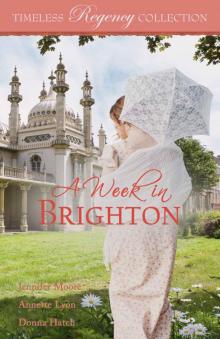 A Week in Brighton (Timeless Regency Collection Book 13)
A Week in Brighton (Timeless Regency Collection Book 13)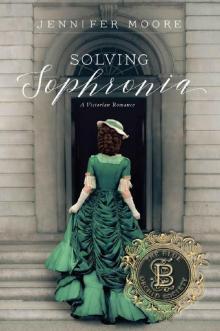 Solving Sophronia (The Blue Orchid Society, #1)
Solving Sophronia (The Blue Orchid Society, #1)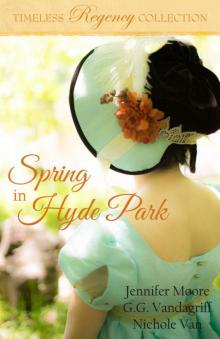 Spring in Hyde Park
Spring in Hyde Park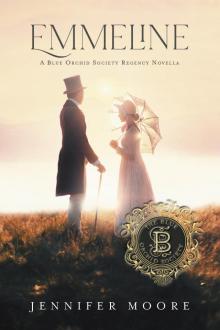 Emmeline
Emmeline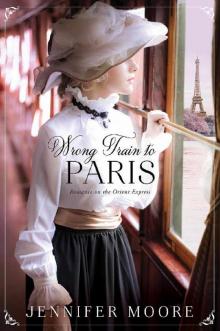 Wrong Train to Paris (Romance on the Orient Express, #2)
Wrong Train to Paris (Romance on the Orient Express, #2)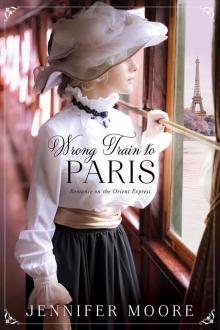 Wrong Train to Paris
Wrong Train to Paris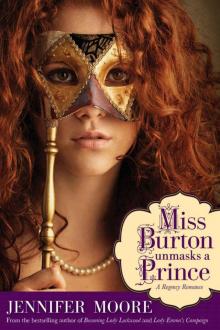 Miss Burton Unmasks a Prince
Miss Burton Unmasks a Prince Safe Harbor
Safe Harbor The Sheik's Ruby
The Sheik's Ruby Change of Heart
Change of Heart Lady Helen Finds Her Song
Lady Helen Finds Her Song Simply Anna
Simply Anna